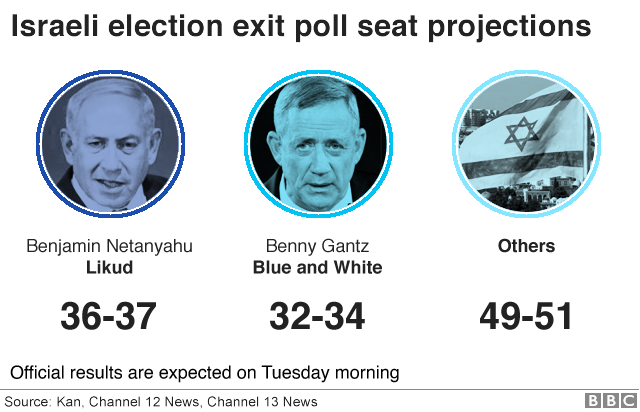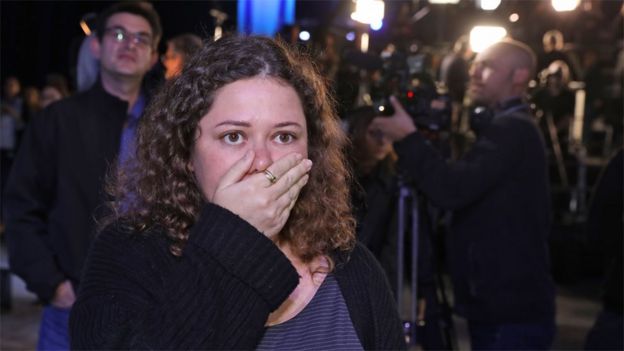Prime Minister Benjamin Netanyahu has claimed victory in Israel’s general election, with early results putting him ahead of main rival Benny Gantz.
Exit polls suggest his right-wing bloc is on course to win 59 seats to become the biggest group but still short of a majority by two seats.
Nevertheless, Mr Netanyahu declared the outcome “the biggest win of my life”.
Monday’s election was Israel’s third in less than a year, after neither leader was able to form a government.
Mr Netanyahu, 70, is Israel’s longest-serving prime minister. He is seeking a record fifth term, having been in office from 1996 to 1999 and again from 2009.
The election took place two weeks before the Mr Netanyahu is due in court to face corruption charges, which he denies.
How close is the race?
Initial projections after voting ended forecast 60 seats for the right-wing bloc, but this was later revised down to 59.
The opposition centre and centre-left parties are on course to win 54-55 seats, according to the exit polls.

The Joint List alliance, representing Israel’s large Arab minority, is projected to get 14 or 15 seats.
Official results are expected on Tuesday afternoon.
Despite the shortfall, Mr Netanyahu promised to build “a strong national government”, in a victory speech to supporters in Tel Aviv.
“We must avoid any more elections. It’s time to heal the rifts. It’s time for reconciliation,” he said.
One Netanyahu loyalist, Miki Zohar, suggested Mr Netanyahu’s Likud party could lead a minority government, while a senior aide said some opposition MPs might defect to Likud, giving the bloc at least 61 seats.
How have opponents reacted?
Mr Gantz, who jointly leads the Blue and White party, did not immediately concede defeat, but accepted that the exit polls did not appear promising.
“I realise and share your feelings of disappointment and pain, for this isn’t the result that we wanted to happen,” he said.
 #
#
Israel, he added, “needs unity, it needs conciliation, it yearns for a leadership that unites, and that is something that we will continue to offer the Israeli public”.
Yisrael Beiteinu leader Avigdor Lieberman, who was in the position of kingmaker after the last two elections, said it would keep its campaign promise not to join a coalition with religious parties.
“We are party with an orderly worldview, with principles,” he said.
In the coming days, President Reuven Rivlin will officially task the leader of the party with the best chance to form a government.
What could this mean for Palestinians?
The secretary general of the Palestine Liberation Organisation (PLO), Saeb Erekat, tweeted after the exit polls were published that it was “obvious that settlement, occupation and apartheid have won the Israeli elections”.

During the campaign, Mr Netanyahu vowed to swiftly annex Jewish settlements and the Jordan Valley in the occupied West Bank if he won a fifth term.
Such a move was made more possible after US President Donald Trump released his Middle East peace plan in January. Mr Trump said the US would “recognise Israeli sovereignty over the territory that my vision provides to be part of the State of Israel”, including parts of the West Bank –
a departure from past US positions.
The Palestinians, who have rejected Mr Trump’s plan as one-sided, insist that all the settlements must be removed if there is to be final peace deal.
More than 600,000 Jews live in about 140 settlements built since Israel’s 1967 occupation of the West Bank and East Jerusalem. The settlements are considered illegal under international law, though Israel disputes this. The US has also declared it no longer sees the settlements as illegal.



